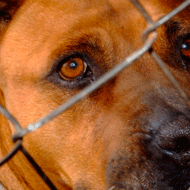One dog seized every 10 minutes in the UK

The Staffordshire bull terrier is one of the most rehomed and destroyed breeds.
Over 36,670 stray dogs were were seized by UK councils in the first eight months of this year, according to new figures. This equates to 151 dogs a day, six every hour, or one every 10 minutes.
The findings, published by Direct Line Pet Insurance, call into question whether Britain really is a nation of animal lovers and whether the 'a dog is not just for Christmas' advice has had any impact.
Topping the list of the most seized breeds is the Staffordshire bull terrier. They are also one of the most rehomed and destroyed breeds.
Surprisingly, labradors, border collies, and akitas also make an appearance. Pit bull terriers, Staffordshire bull terrier crosses, jack russell terriers and crossbreeds complete the top five most disposed of breeds.
In 2014, 66,247 stray dogs were seized by local councils in Britain, amounting to an average of 246 dogs per council. Of these, 35,173 were returned to their original owners, 14,956 were re-homed with new owners and 4,231 were humanely destroyed.
Commenting on the findings Madeline Pike, veterinary nurse at Direct Line Pet Insurance, says: “Staffies are the most seized and disposed of breed in the UK yet they make excellent pets. As a breed, they are caring, loyal dogs who trust people completely and are renowned for their love and protection of children.
"Unfortunately, due to the historical connection with fighting and close resemblance to the Pit Bull Terrier, a banned breed in the UK, many consider these dogs as dangerous, but this may often only be the case if the owner is irresponsible or if the dog has been raised to fight.”
Madeline continues: "The numbers speak for themselves - 66,247 stray dogs having been seized in the UK last year is a staggering amount. While it’s encouraging to see that the majority are either rehomed or reunited with their owners, the reality is that many end up having to be euthanised.
"We have a responsibility to ensure we can look after our dogs and ensure they don’t end up roaming the streets. We urge anyone considering buying a dog for themselves or someone else this Christmas to think carefully beforehand and ensure they are able to care for it.”



 The Animal and Plant Health Agency (APHA) has updated its online reporting service for dead wild birds.
The Animal and Plant Health Agency (APHA) has updated its online reporting service for dead wild birds.